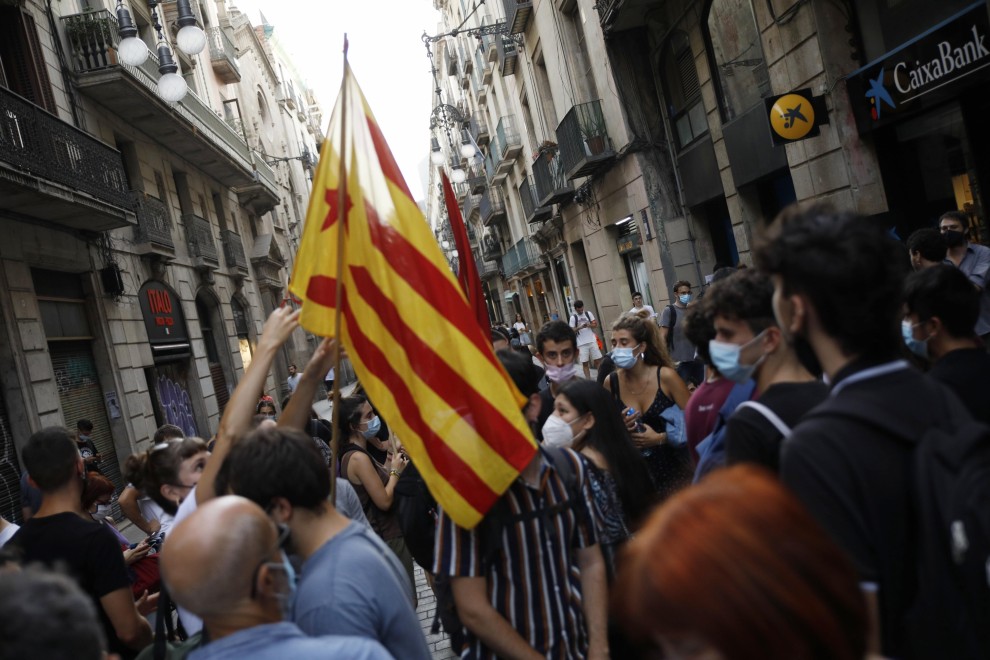Las lenguas de España:
Cuando pensamos en España, como extranjeros, en general pensamos en la lengua española como la lengua de todo este país. De hecho, hay varias otras lenguas regionales que no son el español, y que son lenguas oficiales del Estado. Estas son: el gallego, el euskera y el catalán. Estas otras lenguas cooficiales tienen un número inferior de hablantes que el castellano, el otro nombre para la lengua española, pero son muy importantes como símbolos de las identidades regionales.

An advertisement for ‘Merli’, a popular series in Catalan.
En una ley recientemente propuesta por el gobierno, la nueva ley audiovisual, todas las plataformas de streaming deberán ofrecer un 7,5% de los contenidos en sus plataformas en las otras lenguas nacionales. Las compañías que controlan estas plataformas incluyen: Netflix, HBO, Amazon Prime y Disney Plus. Ahora, solo deben ofrecer servicios con doblaje o subtítulos en una lengua oficial, pero normalmente elijen el español – la lengua más hablada, porque es más rentable para ellos. La ley audiovisual también incluye una demanda que las películas independientes forman el 2% del programa, y que haya más obras audiovisuales dirigidas por mujeres. Para mí esta es una ley muy progresista, y me parece positivo que las otras lenguas del país son representadas en todos los aspectos de la vida – porque también son una parte importante de la cultura de España.
Según Netflix, esta nueva ley es un riesgo para su negocio, y los partidos de derecha en España (el Partido Popular y Vox) tampoco son contentos con esta ley. Para Netflix, este solo es un tema de negocios, pero yo creo que es algo muy políticamente importante. Históricamente, durante la dictadura fascista de Francisco Franco (1939-1975) se prohibió que se habla las otras lenguas del país, y la televisión solo pudiera mostrar programas en español (ni en lenguas de otros países). Esto es una razón por las reivindicaciones de las regiones de España que sus lenguas sean más representadas.
El gobierno español actual de Pedro Sánchez tiene una opinión más reformista sobre los temas culturales. Por ejemplo, ellos recientemente decidieron mover el cuerpo de Franco del ‘Valle de los Caídos’, un mausoleo construido por y dedicado al dictador, algo que los últimos gobiernos democráticos nunca hicieron.
Este tema me parece muy importante porque tiene que ver con el control de la parte del gobierno sobre las grandes empresas multinacionales, y también los derechos culturales de las minorías en España.

The languages of Spain:
When we think of Spain, as foreigners, usually we think of the Spanish language as the language of the whole country. In fact, there are various other regional languages that are not Spanish, and that are official languages of the state. These are: Galician, Basque and Catalan. These other co-official languages have a lower number of speakers than Castilian, the alternative name for the Spanish language, but are very important as symbols of regional identities.
In a law recently proposed by the government, the new audio-visual law, all streaming platforms will have to offer 7.5% of the content on their platforms in the other national languages. The companies controlling these platforms include: Netflix, HBO, Amazon Prime, Disney Plus etc. At the moment, they only have to offer services with dubbing or subtitles in a national language, but they normally choose Spanish – the most spoken language – because this is more profitable for them. The audio-visual law also includes the demand that independent cinema form 2% of the content, and there are more audio-visual works directed by women. In my opinion, this is a very progressive law, and I think it’s positive that the other languages of the country are represented in all aspect of life – because they’re also an important part of Spanish culture.
According to Netflix, this new law is a risk for their company, and the right-wing parties in Spain (the Popular Party and Vox) are also unhappy with the law. For Netflix, this only has to do with business, but I think this is something politically important. Historically, during the fascist dictatorship of Francisco Franco (1939-1975) it was prohibited to speak the other languages of Spain, and television programmes had to be in Spanish (not even in other country’s languages). This is one reason for the demands of the regions of Spain that their languages should be better represented.
 The current Spanish government of Pedro Sanchez has a more reformist opinion on cultural issues. For example, they recently decided to move Franco’s body from the ‘Valley of the Fallen’, a mausoleum built by and dedicated to the dictator, something the previous democratic governments never did.
The current Spanish government of Pedro Sanchez has a more reformist opinion on cultural issues. For example, they recently decided to move Franco’s body from the ‘Valley of the Fallen’, a mausoleum built by and dedicated to the dictator, something the previous democratic governments never did.
This issue is important in my opinion because it has to do with government control of large multinational corporations, and also the cultural rights of minorities in Spain.
